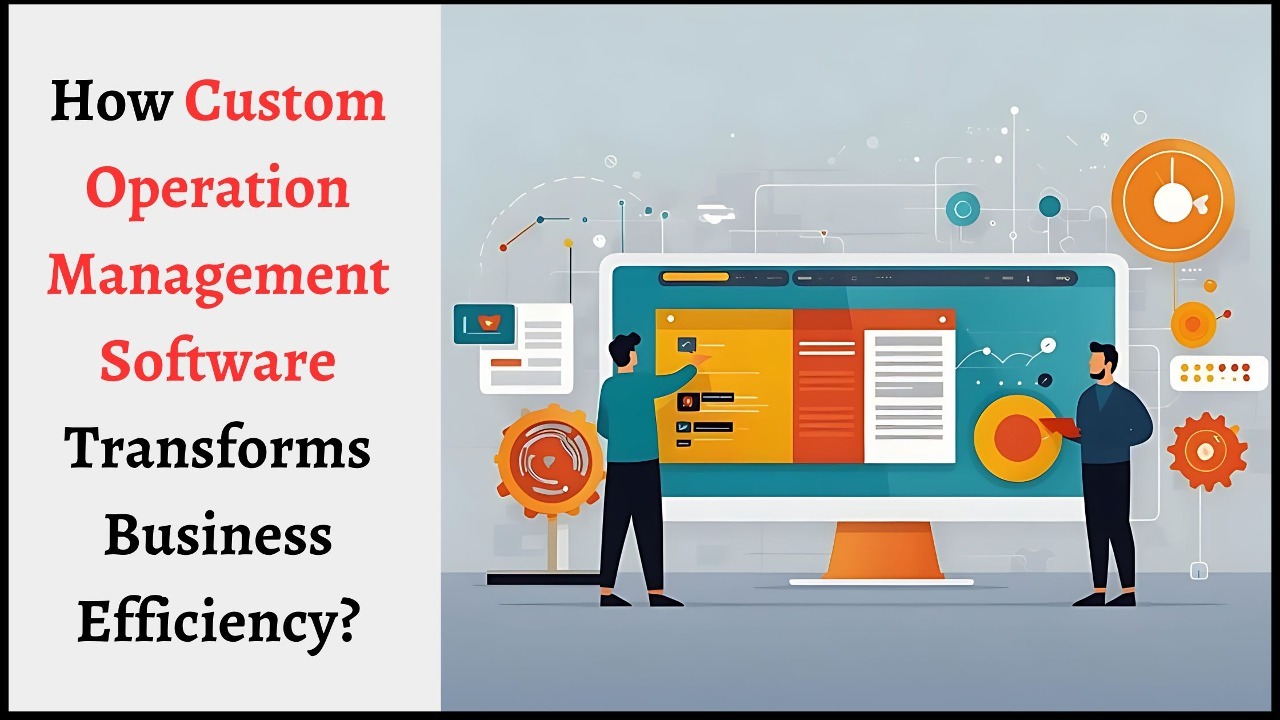- What is Operation Management Software?
- How Does Operation Management Software Work?
- How is Custom Software Development Required?
- How Can Custom Operation Management Software Used?
- Features of Custom Operation Management Software
- Benefits of Custom Operation Management Software
- Detailed Comparison of Custom vs Off-the-Shelf Operation Management Software
- Implementation Process of Custom Operations Management Software
- Cost to Build Custom Operation Management Software
- Future Trends in Operation Management Software
- Architect Modern Tailored Software Solutions in Operation Management With CSSChopper
Today, efficiency is the key for a business to stay competitive. Traditional methods are slowly drowning in every aspect, including operation management. However, some businesses operate without any flaws, while others consistently struggle with their operations. The answer often lies in the method a business utilizes to manage its day-to-day operations. Manual methods of operation management of a business are prone to errors, take ample time, and do not provide real-time insights because of limited ability.
Considering all the limitations of manual methods, the advent of operation management software emerges as a newer and more effective approach. Its popularity is the answer behind effectiveness, as by 2026, its market is projected to reach $15.21 billion with an annual CAGR of 9.6% from 2019 to 2026. These are specifically crafted softwares to help businesses achieve operational excellence by reducing redundant and repetitive processes. It allows a business to monitor, plan, and coordinate effectively with service operations and productions.
However, every business is different, and off-the-shelf solutions are not always the fit you seek. This is where custom software development is the answer. Unlike off-the-shelf solutions, these are built specifically to meet the unique workflow needs of your business.
What is Operation Management Software?
As the name suggests, these are software solutions that can manage the operations of a business, whether they are related to services or product delivery. One can effectively manage the practices and attain the highest day-to-day operational efficiency using operation management software.
These softwares have greatly helped various businesses in improving not only their effectiveness but also the productivity of their team members. An organization is a mixture of several departments, like marketing, sales, R&D, and more. Operation Management Software (OMS) plays a vital role in ensuring that every department of the organization should work together to achieve the common goal of a business.
How Does Operation Management Software Work?
Operation management software relies mainly on data and how it has been maintained and articulated to provide accurate information to the end-users. It can assist in providing real-time data insights, allowing a business to make informed decisions and improve efficiency. With the help of process mapping and diagrams, this software visually represents the involved steps in any undergoing process. This mapping also assists with identifying bottlenecks and improving efficiency.
How is Custom Software Development Required?
Custom development often provides a range of advantages to a business and can be better than off-the-shelf solutions. These can provide a high level of flexibility and control to manage your business’s unique and regular workflows. You are not forced to adjust your practices to fit the generic software solution; custom software can adjust and adapt to meet the end goals. However, it requires expertise, and opting for bespoke software development services can help you create one with expertise and precision.
How Can Custom Operation Management Software Used?
Every business can use most of the custom operation management software. Whether manufacturing or healthcare, businesses of different types can utilize custom OMS for their unique operations. Let’s understand how some specific businesses can use this:
1. Manufacturing
A manufacturing business can include specific features in its OMS to track the inventory, manage production-related schedules, and also optimize the supply chain. This way, the software provides complete information and enables a business to make informed decisions based on the data.
2. Healthcare
A healthcare organization should prepare custom software to effectively manage patient records by integrating features that can assist in scheduling patients’ appointments with doctors and tracking their medical bills.
3. Retail
A retail business can also utilize a custom OMS to improve the efficiency of its operations. Whether for inventory management or sales tracking, custom software can assist a retail business owner in making better decisions.
4. Logistics
Custom software garnered for a specific logistic business niche can assist a business in improving its productivity and efficiency. With software, one can track shipments, manage transportation, and optimize delivery times.
5. Finance
A finance business can utilize this software to gain a distinctive edge by tailoring the technology to meet finance-related operational needs. From tracking experience and managing financial performance to managing accounts receivable and payables, an OMS can aid in solving finance-related problems.
Features of Custom Operation Management Software
Features make the software more effective and better than the rest. When it comes to custom software, your project requirements play a pivotal role. An effective operation management software is one that provides the right combination of core, advanced, and industry-specific features.
1. Core Features
Do not miss out on including the core features in your tailored software solution. These are the innermost and most essential parts of an OMS that play a pivotal role in its success. You can include core features, like:
-
Task Management
Everyday tasks are set or will change as per the requirements. It is wise to include a task management feature to actively manage all your business tasks in one centralized platform. With the help of this, you can assign a specific task to a specific team member, set its deadline, and track the progress of a task.
-
Workflow Management
It is crucial to effectively manage the flow of work in a business, which is why this is the core feature one should not miss out on. This feature allows you to define the workflow, streamline, and map the processes. Moreover, it helps fill the bottlenecks, resulting in improved productivity.
-
Resource Allocation
It is crucial to manage the resources for better efficiency of operations. Your tailored software solution should have a core feature to allocate and manage resources effectively. This feature helps with the optimization of resources and also prevents their over-allocation for a smooth workflow.
- Project Management
Every business should require effective management of projects, whether product or service-based. This feature helps plan, execute, and monitor the projects from start to finish.
-
Analytics and Reporting
A custom operation management software must have an analytics and reporting feature. It should help gain insights related to performance, find areas for improvement, and assist in improving the decision-making ability of a business.
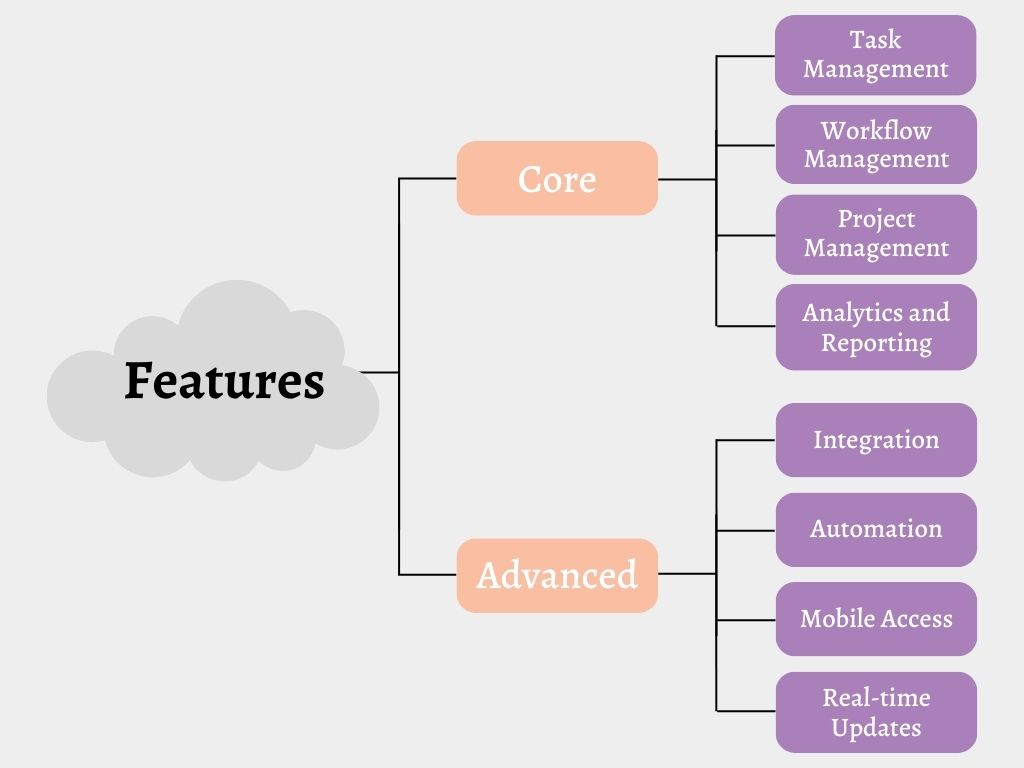
2. Advanced Features
Core features will set the foundation, but what if your requirements are more than basic? In this case, including advanced features in your OMS can significantly help. These are as follows:
-
Integration With Other Systems
You can integrate your OMS into other systems like CRM, ERP, or SCM to provide a unified platform. However, you should ensure data consistency during integration for effortless and flawless operations.
-
Automation
Repetitive tasks are the real bottleneck for a business, especially those competing with leading businesses. You must minimize this by including an automation feature in your custom operation management software. Automation can assist in completing tedious tasks quickly, saving time and money simultaneously.
-
Mobile Access
Every individual operates a mobile device. You can integrate a feature that makes it easier to access operation management software on mobile phones. This will enable the access to software from anywhere and anytime.
-
Real-time Updates
Real-time updates are essential for operation management software, as they provide timely updates and insights into operations. This enables a business to make informed decisions and respond quickly to changes.
3. Industry-Specific Features
Every industry is different, and, indeed, including the same feature for every industry is not because of changes in operations. Here is how different industries can include features in their operation management software:
-
Healthcare
A healthcare organization can include features in its custom software, like patient management for maintaining patient records, appointment scheduling bills, and others. It can also integrate Electronic Health Records (EHR) for secure data storage and maintenance.
-
Manufacturing
The manufacturing industry can take advantage of tailored software solutions for operations management by including features like inventory management, quality control, and production scheduling.
-
Retail
A retail business operates differently and must have different needs, and integrating features that fulfill them is required. Features like point of sale, customer relationship management, and supply chain management can improve the operations of a retail business.
-
Logistics
Features like route management and optimization, fleet management, and transportation management can greatly help in efficient logistics operations. They can also include a warehouse management feature to monitor the products’ real-time movements to avoid inventory failure.
Benefits of Custom Operation Management Software
Developing a system that is tailored to the requirements of your business operations provides a range of benefits, from high-end security to better productivity. Here are some of them:
-
Security
Security is essential in preserving your operations’ most crucial information. Custom software development significantly helps in this regard, as you have complete control over the type of security features you integrate into your solution. Conversely, an off-the-shelf operation management software is also secure, but only to a certain extent. This is because it will have the same security feature for distinctive businesses.
-
Scalability
A tailored software solution is not only secure but also scalable. This means you can scale it to meet the changing requirements of your business. All this is done without spending excessive money on additional licenses and subscriptions.
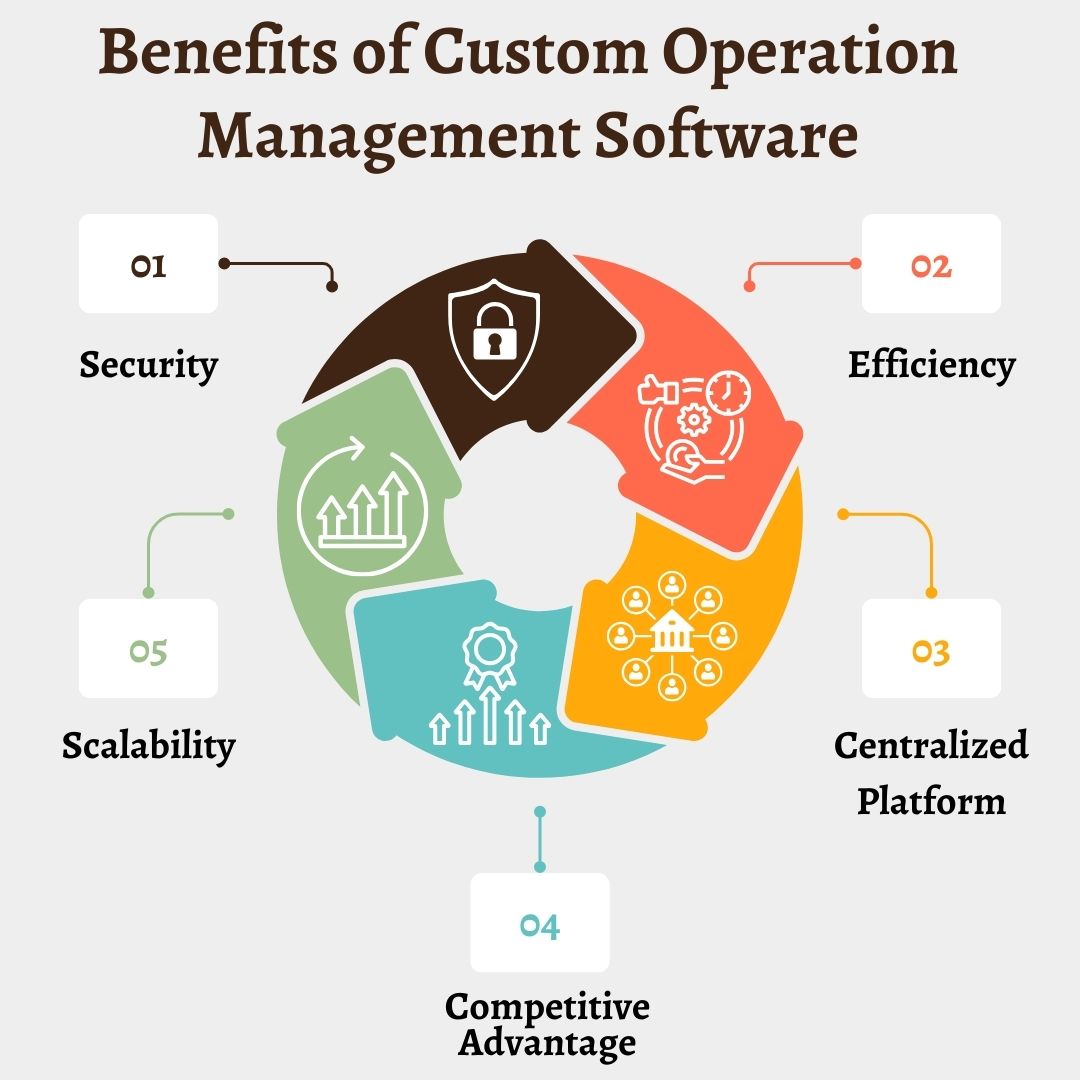
-
Efficiency
Operation management software is designed to improve the efficiency of a business. However, this can be further improved with custom software because of the known ability of custom solutions to be built according to the requirements. Automation, advanced analytics, and predictive modeling to improve not only efficiency but also productivity.
-
Competitive Advantage
When you effectively manage the operations of your business through a tailored software solution, your products and services will be improved. This way, you can streamline the different business processes, increasing profitability. You can gain a competitive advantage over your competitors with better productivity and efficiency.
-
Centralized Platform
Operation management software reduces the complexity between departments and operations through effective project management. Clear guidelines also help improve workers’ productivity. Moreover, custom software helps reduce waste through efficient inventory management.
Detailed Comparison of Custom vs Off-the-Shelf Operation Management Software
Off-the-shelf and custom software are different in terms of various factors. Both are effective but with varying business requirements. Here is a detailed comparison:
| Custom Operation Management Software | Off-the-shelf Operation Management Software | |
| Cost | Tailored software solutions require high upfront costs but do not have any hidden fees. | Off-the-shelf solutions require less upfront cost but are costlier because of hidden maintenance, license, and upgrade costs. |
| Functionality | On-demand features and functionality can be introduced | An OMS vendor defines features and functionalities |
| Customizability | Highly customizable to meet the end user requirements | Limited customizability |
| Compatibility | High-level of compatibility | Less compatible |
| User Base | Designed and developed for specific users | Developed for a broad range of audiences |
| Training | Training can be customized based on specific needs | Basic training is available that might not cover all the features |
| Scalability and Flexibility | Highly scalable and flexible to meet the needs of a business | The vendor restricts scalability and flexibility |
| Security | Custom coding minimizes security risks. Also, one can include advanced security features in custom solutions. | Security depends on the cybersecurity measures a vendor follows |
| Development Time | Development takes time because of need-based custom coding. | Off-the-shelf solutions are ready-to-go and require less development and implementation time. |
| Maintenance and Support | Provided by the technology solution partner or an in-house team | It all depends on the vendor. |
Implementation Process of Custom Operations Management Software
How can a business create custom operation management software? Custom development requires expertise, and partnering with a bespoke software development services provider is no exception. However, here are the steps a particular team should follow while doing the process.
1. Requirement Analysis
An expert team can only create a solution by analyzing project requirements. This is the foremost step, as it involves thorough brainstorming to find the right features and functionalities in your software. This phase covers not only features but everything related to your project.
2. Project Planning
After requirements analysis, the technology solution provider focuses on planning your custom operation management software’s planning. This stage involves several steps, from defining the objectives and scope of the project to documentation and training. By meticulously planning everything, a tech partner will assist you in laying the strong foundation of software.
3. Design Formulation
After effectively planning for each stage, experts will assist you with the design part. They will help you design the UX and UI of the software to ensure better scalability and uniqueness.
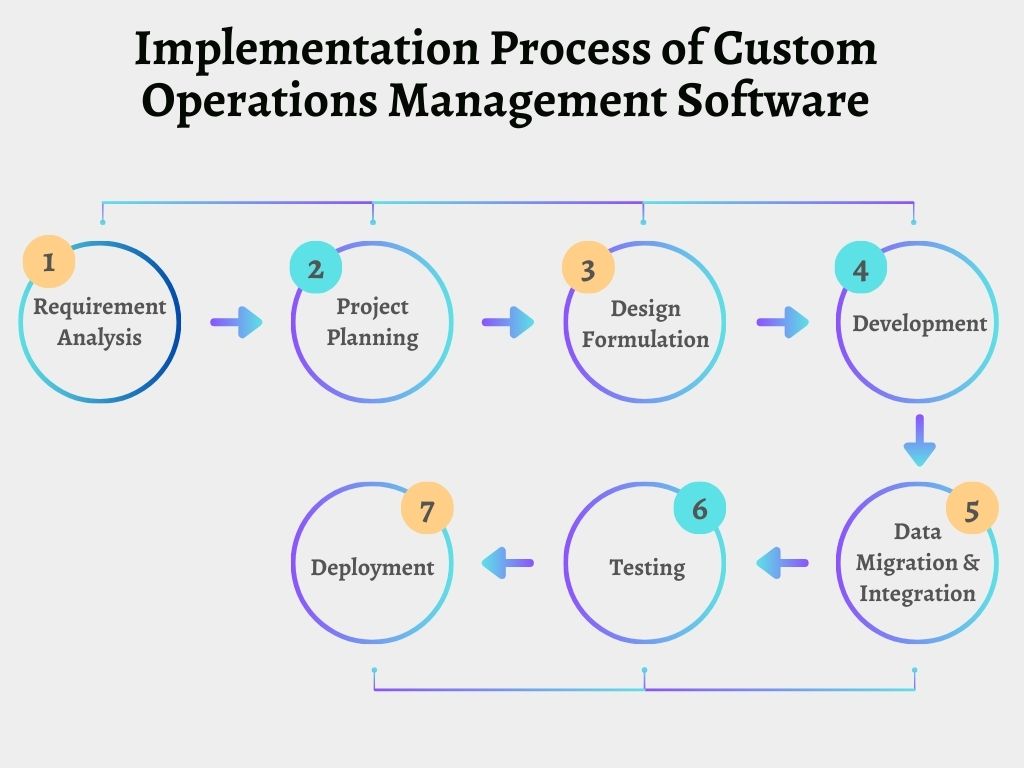
4. Development
For effective development, a team can utilize the right framework and technology to meet the requirements of a project. This is the stage where the transformation of your vision into a functional system takes place. The development team must follow an agile development methodology to ensure top-tier quality.
5. Data Migration
After completing the development process, migrating your data to the system becomes crucial. You can migrate your data, including sales, purchases, or return order data, that you have maintained manually in spreadsheets or any off-the-shelf solution.
6. Testing
Testing plays a crucial role in ascertaining whether software is working as expected. An experienced team can perform testing to find out any bug related to development, data migration, or design. From manual to performance testing, numerous tests are conducted to ensure a smooth and seamless function of the tailored software solution.
7. Deployment
Once everything is completed, the last stage of the implementation process is the deployment. The expert team ensures a smooth deployment process and further support to address any issue that might arise in the future.
Cost to Build Custom Operation Management Software
The development cost depends on factors like complexity, features, development team, security policies, and technology stack. A basic or moderate solution with few features and a basic tech stack might cost between $10,000 and $25,000. In contrast, highly complex operation management software with advanced features and a modern technology stack could cost between $5,00,000 or more.
Here is a roughly curated breakdown of the development cost for different operation management software types:
- Fleet management software manages and monitors vehicles like cars, trucks, vans, and buses. The cost of development depends on the complexity, and it can range from $10,000 to $45,0000 or more.
- Performance management software is used to track, analyze, and evaluate the performance of employees. Its development cost depends on the features and complexity and can cost approximately around $25,000 to $3,00,000.
- Facility management software helps organizations manage their facilities more efficiently and effectively. With potential setup fees, it can cost from $500 to $5000/month.
Future Trends in Operation Management Software
As we move forward, trends in operation management software will be quite visible. Adapting to these changes becomes essential if a business has to operate effectively. Here are some of the trends:
1. Predictive Analysis
This can be integrated into operation management software that uses data and statistical algorithms to forecast future trends and possibilities. This can help with real-time decision-making and critical task automation.
2. Centralized Digital Sources
Staying consistent with trends is a must in operation management software. One trend that one should include is a centralized mobile platform. It can help connect people, processes, systems, and documents to improve employee productivity.
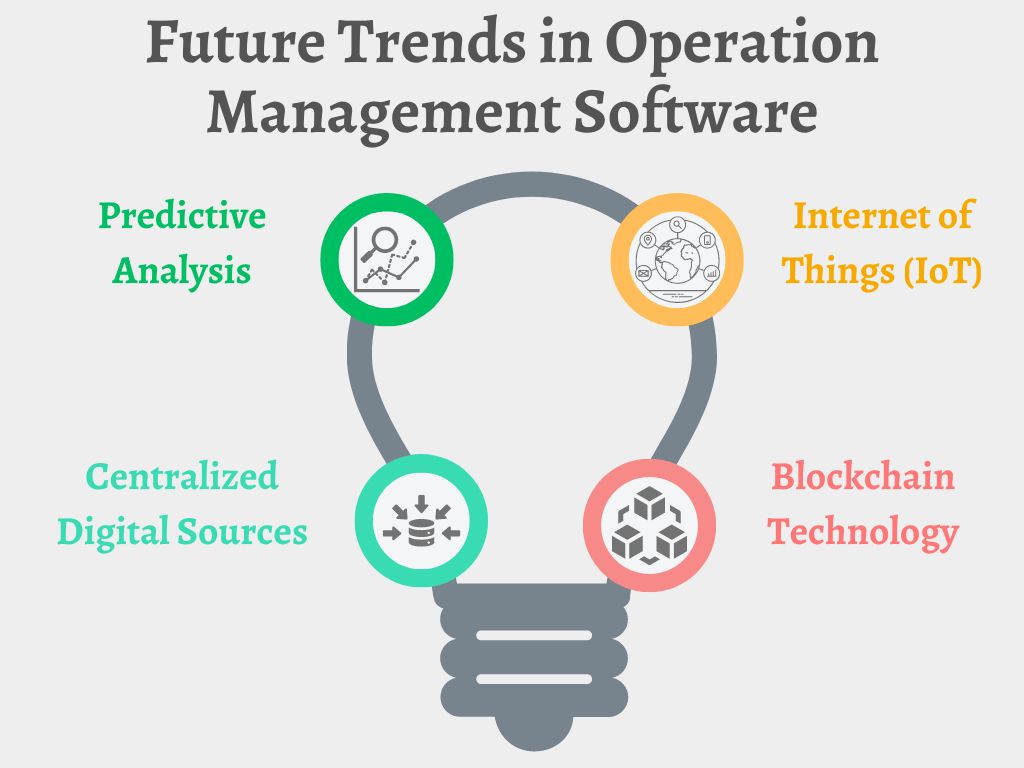
3. Internet of Things (IoT)
One of the most awaited trends to integrate into software managing operations. This can transform operation management by connecting machines, people, and real-time data analysis and collection processes.
4. Blockchain technology
Blockchain is a trend that can also be used in operation management software. It can improve transparency and supply chain resilience, enhance operational efficiency, and minimize fraud risks.
Architect Modern Tailored Software Solutions in Operation Management With CSSChopper
CSSChopper is well-equipped with experts and skilled web developers specializing in operation management development. Our team also specializes in building custom solutions by combining innovative technologies correctly. Moreover, we build power-packed operation management software related to the requirements of different businesses.
At CSSChopper, we ensure your software enhances efficiency, improves decision-making, and streamlines operations. Our team utilizes agile development methodology to ensure the delivery of quality-packed softwares within deadlines. Connect with us to level up the journey of your operation management software.
Categories
Recent Posts
Popular Posts
- How to Choose a Reliable Offshore Development Partner?
- Transforming Web Development with HTMX’s Declarative Approach for Dynamic UIs
- Why Your Conversion Funnel Needs a Composable Commerce Solution?
- How to Outsource Web Development in 2025: Complete Guide
- What are the Top Web Development Trends for 2025?

